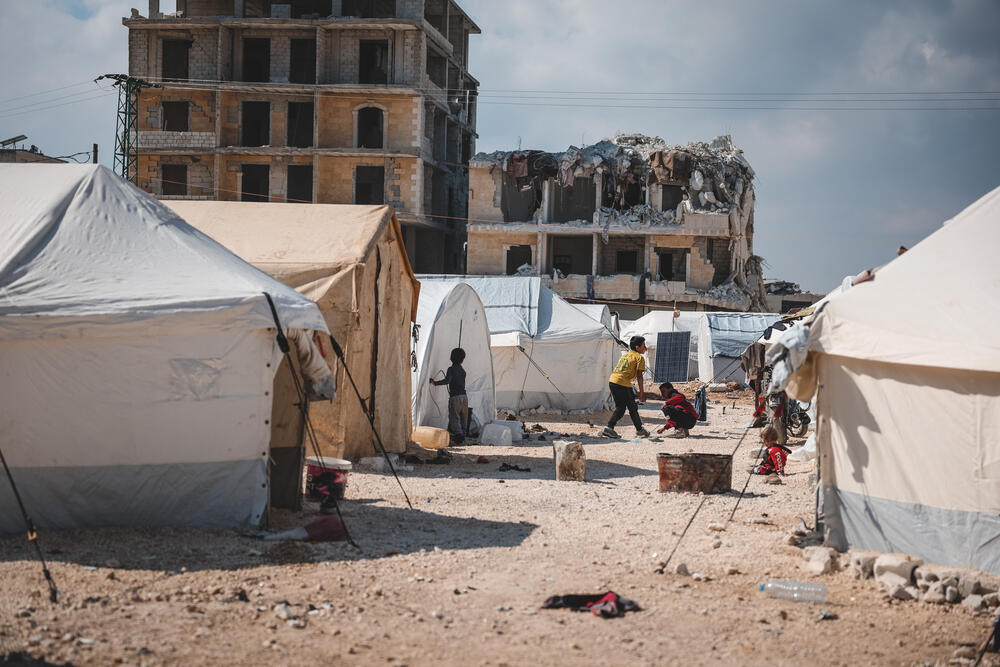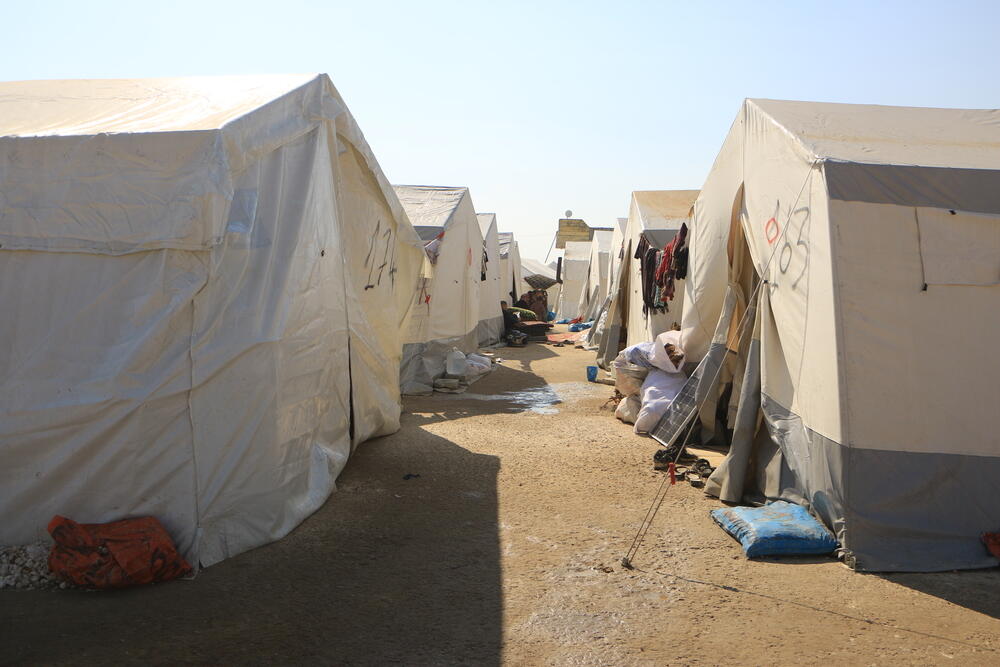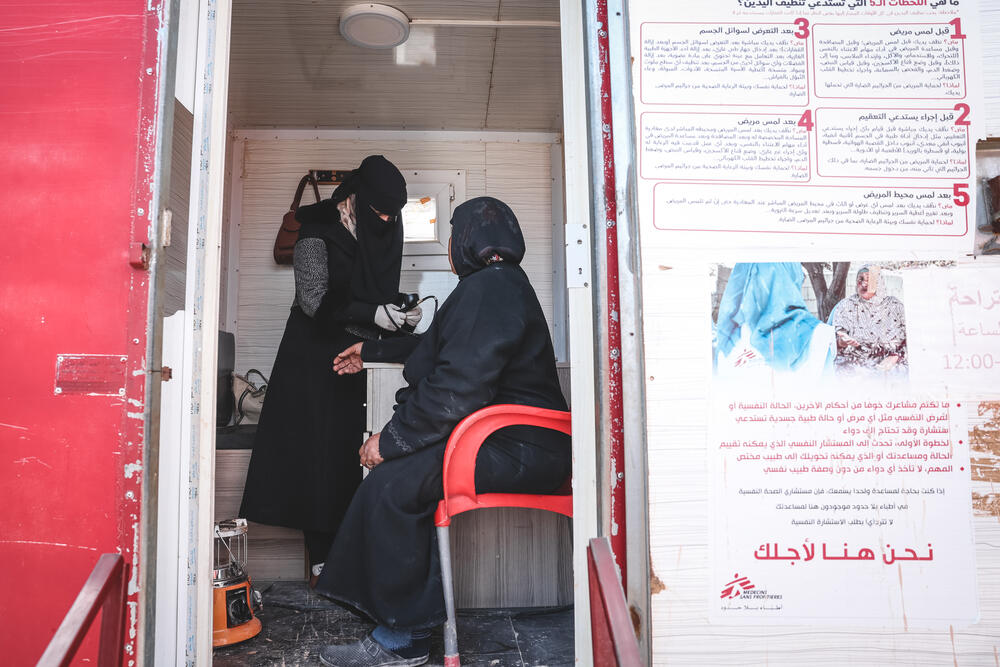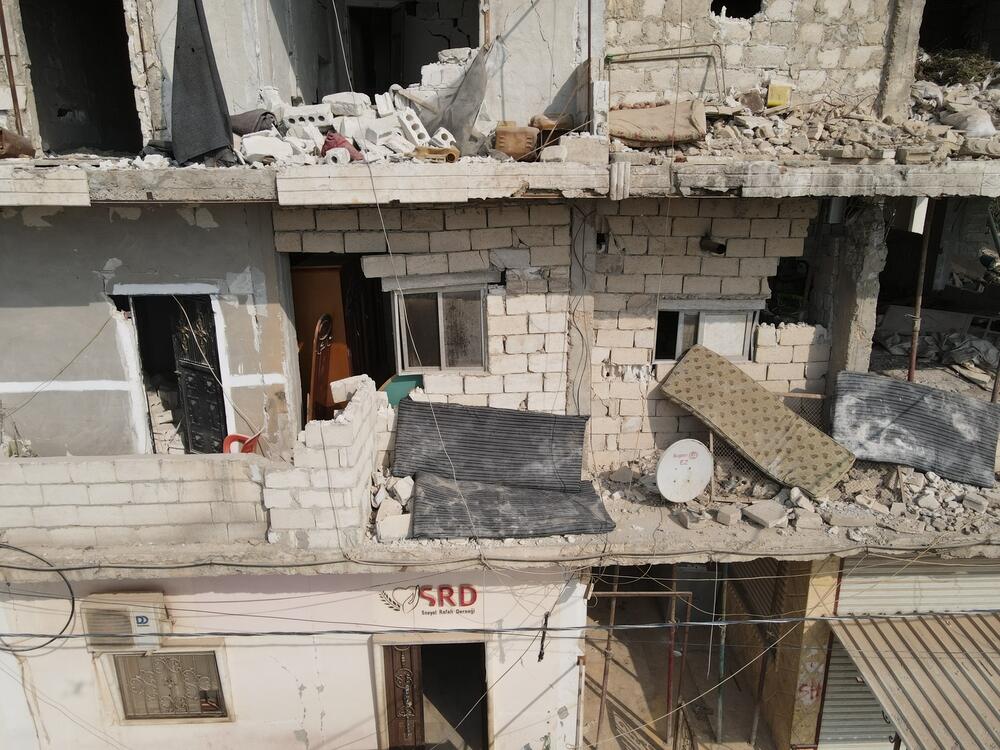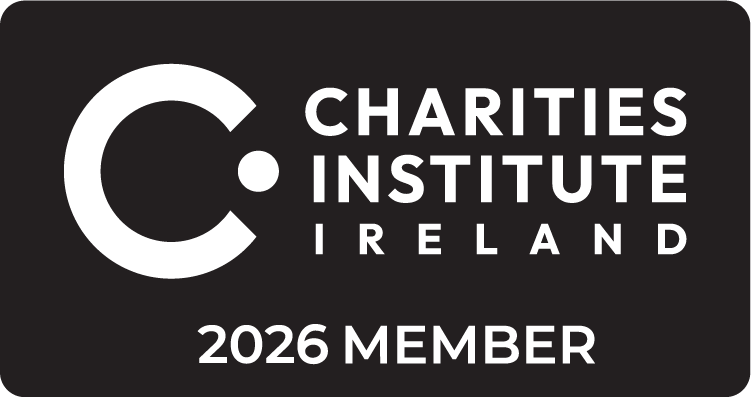Ongoing Efforts: Six Months of Humanitarian Action After Earthquakes in Northwest Syria
8 August 2023
Syria - Six months have elapsed since the catastrophic earthquakes struck Northwest Syria, leaving in their wake a landscape marred by destruction and despair. The aftermath of this catastrophe has imposed severe challenges on an already fragile healthcare system and disrupted the lives of countless individuals. Across the affected areas in northwest Syria, Médecins Sans Frontières (MSF) and its partners have been at the forefront of efforts to rehabilitate facilities, provide essential medical services, and alleviate the hardships endured by the displaced population in the most affected areas such as Jandaris, Sarmada, Armanaz, Jisr Al Shughur, Al Maland, Harim, and Salqin.
“The earthquake was a state of panic and fear, a situation we had never experienced before. Although we had faced many incidents such as bombardment on cities and towns in northwestern Syria, this time it was completely different.”
Describing the situation six months after the earthquakes, Alaa Abdullah, MSF Nursing Team Supervisor in Idlib, says: "People in northwestern Syria have been trapped for twelve years, experiencing internal displacement as they move in search of relatively safe places. They also suffer from deteriorating living conditions due to challenging economic circumstances. The earthquake on February 6 exacerbated this suffering, forcing many residents to leave their permanent homes, such as houses, and relocate to shelters and displacement camps due to extensive damage to buildings and infrastructure in the area. These conditions have had a negative impact on the healthcare needs of people in northwestern Syria, as skin diseases have emerged in the new displacement camps due to changes in the lifestyle of earthquake-affected individuals. Natural disasters have a challenging and lasting negative impact on people's lives in the disaster-stricken area.”
Ongoing Struggles and Progress in Affected Areas:
Following the aftermath of the earthquakes, Northwest Syria has been struggling with a dire healthcare situation. The situation has been worsened by pre-existing issues, such as underfunded medical facilities and limited services, which require swift and robust action. The Jandaris subdistrict has been hit the hardest, with over 1000 reported deaths and 80% of structures affected.
However, amidst the ruins, there are signs of progress. The rubble clearance in Jandaris has been successful, setting the stage for reconstruction. Additionally, the establishment of internally displaced persons (IDP) camps in Afrin subdistrict has provided a semblance of refuge for those uprooted by the disaster. In Idleb and Aleppo areas, MSF has not only focused on facility rehabilitation but has also constructed an extension to the Mashad Ruhin facility to accommodate the influx of internally displaced persons. The medical staff at the facility has been bolstered with the addition of one doctor and one nurse.
“Some of these areas, particularly the most affected by the earthquake, are in urgent need of health and psychological follow-up, given the increase in cases of psychological disorders caused by factors such as loss of family and friends, panic, fear, and various injuries.”
Mohammed Al-Aziz, MSF Community Health Workers Supervisor in Idlib witnessed some signs of progress amidst the struggles. He says, "Recently, signs of returning to normal life and engaging in daily and routine activities have been observed in some areas of northwestern Syria. This is evident from people repairing the damage caused by the earthquake to secure a better life and living conditions than those in camps and shelter centres. However, some of these areas, particularly the most affected by the earthquake, are in urgent need of health and psychological follow-up, given the increase in cases of psychological disorders caused by factors such as loss of family and friends, panic, fear, and various injuries. Also, some families remain unstable and unable to fully integrate into the community due to the challenging circumstances they experienced during the earthquake, and the shortage and difficulty in securing their needs."
MSF's Rehabilitation Endeavours:
Immediately following the earthquake, MSF launched an emergency response, providing trauma kits and support to hospitals within the first 48 hours. The rehabilitation phase encompassed a range of activities aimed at restoring healthcare facilities and services. This included continuing support for 15 reception centers, establishing advanced burn patient locations (Jisr Al Shughur, Sarmada – Andalus Hospital, Daret Ezzeh – Amal Hospital), and deploying mobile teams across 80 locations. MSF's support also extended to Afreen General Hospital, which played a vital role as a voluntary effort. While commendable progress has been made, MSF's efforts are not yet complete. Key healthcare centers remain in the rehabilitation phase, underscoring the ongoing need for resources and commitment.
As the situation shifts, the focus has pivoted to orthopedic care. MSF's support for an orthopedic hospital has included training for orthopedic surgeons and improvements in infection prevention and control (IPC). However, impending funding constraints are poised to impact the hospital's operations in the coming weeks.
Collective Centers have emerged as focal points of humanitarian aid, providing essential housing for displaced populations. However, challenges persist with suboptimal living conditions and inadequate hygiene facilities, testing the resilience of both inhabitants and aid providers. The Syrian Ministry of Displacement and Humanitarian Affairs (MDHA) has embarked on a transition strategy, relocating individuals to housing projects or caravans for improved living standards. Yet, the longstanding gaps in specialized healthcare services persist, hindering access to essential medical care.
Mental Health and Recreational Support:
"The earthquakes that occurred on February 6th caused widespread psychological distress among individuals, with a significant increase in psychological disturbances. Cases of maladjustment to the post-earthquake situation have emerged, characterized by increased panic and fear, particularly among children. This has led to behavioral problems such as bedwetting, increased aggression, attachment to parents, nightmares, and social isolation," says Alaa Abdullah, MSF Nursing Team Supervisor in Idlib.
Acknowledging the psychological toll of the earthquake, MSF has extended its reach to encompass mental health support. The organization has initiated mental health services in mobile clinics, which have become an integral part of ongoing activities. Recreational activities have been introduced in various collective centers, including Al Nour, As Sana, Wade Raseef, and Al Kwathar camps, to provide psychological relief and support. Social workers and lay counselors are engaged in these activities, referring identified cases to MSF Mental Health and other medical services, as well as other organizations that can provide non-medical and social support.
As the recovery process continues, MSF remains committed to its ongoing efforts. However, earthquake response-related activities have been integrated as part of MSF's regular activities. These efforts focus on extending facilities, recruiting additional medical staff, and providing essential mental health and recreational activities. MSF's response to the aftermath of the earthquake in Northwest Syria encapsulates a comprehensive approach that spans emergency care, rehabilitation, and ongoing support.
While significant strides have been made, challenges in healthcare access, living conditions, and specialized services persist. This underscores the need for sustained efforts.
“It will require a considerable amount of time for the people to overcome the disaster and its aftermath”, says Mohammed Al-Aziz, MSF’s Community Health Workers Supervisor in Idlib.
